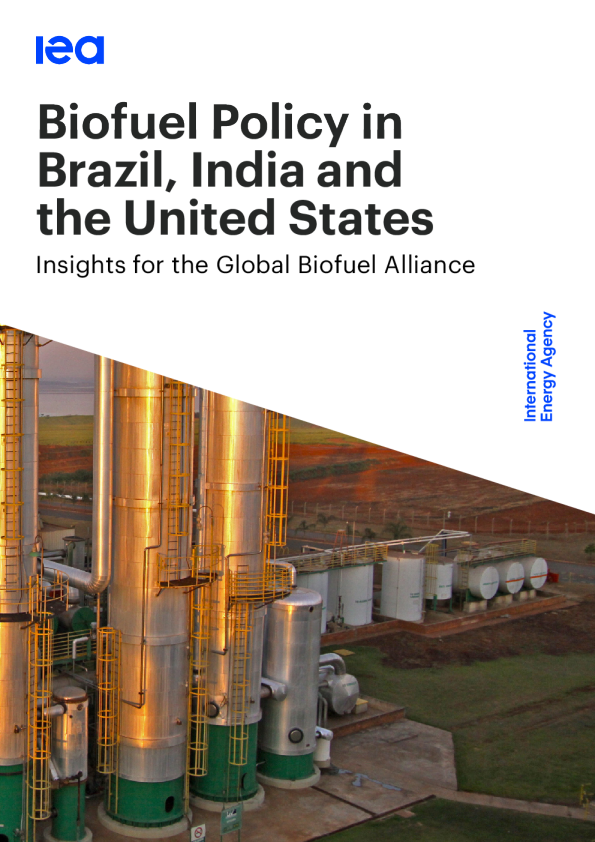巴西、印度和美国生物燃料政策
 AI智能总结
AI智能总结
巴西、印度和美国生物燃料政策 全球生物能源联盟洞察 国际能源署 IEA成员国家: IEA 协会国家: 国际能源署(IEA)考察了包括石油、天然气和煤炭的供需、可再生能源技术、电力市场、能源效率、能源获取、需求侧管理在内的全面能源问题。通过其工作,IEA倡导在其31个成员国、1个协会和3个国家以及更广泛的地区,增强能源的可靠性、可负担性和可持续性的政策。 澳大利亚 奥地利 比利时 加拿大 捷克共和国丹麦 爱沙尼亚 芬兰法国 德国 希腊 匈牙利 爱尔兰 意大利 日本 韩国 立陶宛 卢森堡 墨西哥 荷兰 新西兰 挪威 波兰 葡萄牙斯洛伐克共和国 西班牙 瑞典 瑞士 土耳其共和国 英国 美国 阿根廷 巴西 中国 埃及 印度 印度尼西亚肯尼亚 摩洛哥 塞内加尔 新加坡 南非 泰国乌克兰 此出版物及其中包含的任何地图均不损害对任何领土的归属状态或主权、国界和边界的划界以及对任何领土、城市或区域的命名。 欧洲委员会也参与国际能源署的工作。 摘要 作为其G20主席国,印度提出建立一个全球生物燃料联盟(GBA),以将各国汇集在一起,扩大并创造可持续生物燃料的新市场。GBA将带来的最佳实践分享、技术支持和能力建设是国际努力扩大可持续生物燃料生产和使用的欢迎补充,这是实现交通运输和供热服务脱碳的关键步骤,也是确保能源供应安全和经济的关键。 本报告旨在通过分享来自巴西、印度和美国的生物燃料政策洞察,为联盟的工作提供信息和聚焦。我们发现,这些国家通过制定长期战略、实施正确的投资信号、支持创新、确保供应既安全又实惠、早期解决可持续性关注问题以及与国际社会合作,扩大了生物燃料的生产和使用。此外,有三个优先领域将有助于支持全球能源转型中的可持续生物燃料部署:识别并帮助开发可持续生物燃料生产潜力高的市场、加快技术部署以及寻求基于性能的可持续性评估和框架的共识。 致谢,贡献者及信用 本项研究由可再生能源部门与生物未来平台(一个清洁能源部长级倡议的成员)的成员共同准备。研究由可再生能源部门负责人Paolo Frankl构思并指导。报告的设计、分析和制作由可再生能源部门生物能源分析师Jeremy Moorhouse领导并协调。 宝贵的评论、反馈和指导由能源市场和安全部总监Keisuke Sadamori以及石油行业和市场部门负责人Toril Bosoni提供。我们还要感谢Praveen Bains、Ana Alcande Bascones、Hana Chambers、Alejandra Bernal-Guzman、Astha Gupta(顾问)、Joerg Husar和Kavita Jadhav。 包括Jim Spaeth(DOE – 生物能源技术办公室系统集成计划经理/Biofuture平台倡议主席)、Keith Klein(橡树岭国家实验室 – 著名科学家)、Gerarld Ostheimer(清洁能源部长级会议Biofuture运动经理)、Andrea Rossi(IEA生物能源TCP –秘书)和Adam Brown(Energy Insights Ltd. – 首席执行官)在内的Biofuture平台成员作出了重要贡献。 本工作受益于来自拉伊丝·德·索萨·加西亚(巴西外交部——可再生能源部门负责人)、马尔隆·阿拉埃斯·贾迪姆·利尔(巴西矿业和能源部——生物燃料部门主任)、乔治·托马斯(印度石油和天然气部——国际合作司主任)的审阅和贡献。 作者还想要感谢Gregory Viscusi编辑报告,以及IEA通讯与数字办公室,特别是Astrid Dumond。 本政策洞察报告是在与生物未来平台(一个清洁能源部长级倡议)的成员紧密合作下开发的,该平台由国际能源署(IEA)担任协调者。 目录表 全球生物燃料联盟的影响………27执行摘要................................................................................................................. 6引言 ............................................................................................................................. 8可持续生物燃料产量必须到2030年在净零排放轨迹上增长三倍 ............................. 8传统和先进燃料均呈增长趋势......................................................................... 9学习政策实施经验有助于扩大可持续供应量................................10扩大可持续原料供应和开发新市场需要特别请注意... 11巴西 ..................................................................................................................................... 13美国......................................................................................................................... 17印度....................................................................................................................................... 21学习到的经验.................................................................................................................... 25 执行摘要 印度提出了全球生物燃料联盟,旨在支持全球可持续生物燃料的发展和部署。全球生物燃料联盟(GBA)旨在建立一个全球性的合作平台,包括各国政府、机构、行业和其他利益相关者,以推进可持续生物燃料技术的部署和扩大可持续生物燃料的市场渗透。GBA认识到可持续生物燃料是全球能源转型的一个支柱。GBA的管理框架和行动计划将在未来几个月内制定。 生物燃料具有众多优势。2022年,液体生物燃料在运输部门避免了每天近200万桶石油的使用,占全球运输需求的超过4%,有助于在能源危机期间保障能源供应。生物燃料还与现有基础设施兼容,可以使用废物和残留物制造,并为农村社区提供经济和就业机会。 可持续的生物燃料生产并未走上净零排放的轨迹:到2028年,全球生物燃料的增长率不到实现中世纪中期净零排放目标所需速度的 一半,基于当前的政策和市场趋势。根据国际能源署的“2050年净零排放”(NZE)情景,可持续生物燃料的生产到2030年需要增加三倍,以帮助减少新及现有卡车、飞机、船舶和乘用车等排放,而这些交通工具的其他缓解选项很少。 全球超过80%的生产集中在仅仅四个市场:美国、巴西、欧洲和印度尼西亚。这些市场仅占全球交通运输燃料需求的半数。预计到2028年,这一份额将下降至接近40%。因此,扩大可持续生物燃料将需要开发新的市场并在现有市场中提高其使用率。 巴西、印度和美国展示了推动供应增长显著的政策。巴西、印度和美国实施的政策保持了至少五年的年均增长率超过20%。因此,在2022年,生物燃料提供了巴西22%和美国7%的运输能源。在印度,乙醇在汽油车能源消耗中的份额在2022年达到了6%,是2019年的两倍。 六项政策支柱支撑了生物燃料的增长:巴西、印度和美国通过制定长期战略、实施正确的投资信号、支持创新、确保供应稳定和价格合理、尽早解决可持续性问题以及与国际社会的合作,扩大了生物燃料的生产和使用。 可持续的原料供应足以在2030年将生物燃料产量翻三倍。从有机废物和残留物中生产的先进生物燃料,例如,到2030年可能额外支持2.4百万桶石油当量/日,超过2022年的生物燃料总产量。这种增长水平需要先进生物燃料部署增加十五倍。在IEA的NZE情景中,传统生物燃料产量也将扩大,但程度较小,生物燃料不会导致耕地的净增加,也不会在现有的林地上种植生物燃料作物。先进和传统燃料的混合比例将随着每个国家而异。 需要更多的技术研发和创新努力来拓展可持续的原料。该IEA的非化石能源情景下的增长规模和速度需要:1)提高土地生产力,以充分利用现有农地和边际土地;2)改善与现有生物燃料技术(如残余植物油)相兼容的原料的废料和残留物收集;3)部署能够处理不同原料(如农业和森林残留物)的技术。 全球生物燃料联盟可以加速可持续、安全且经济实惠的生物燃料的部署。有三个优先领域将促进可持续的生物燃料部署,以支持全球能源转型: �提升可持续供应的测量与监控:对于优先市场,开发并应用一致的可持续原料评估、监测和报告方法。 �评估混合技术发展路径:每个优先市场都将拥有其传统和先进生物燃料技术以及碳捕集、利用和储存等温室气体(GHG)减排技术的潜力。 �开发针对特定区域的政策包,借鉴现有经验。巴西、印度和美国提供了六个成功政策支柱的例子,以及可以用于支持新市场政策包的共同挑战。 �加快先进生物燃料的商业化技术部署:协调一致的国际努力对于大规模商业化先进生物燃料至关重要,这对于实现生物燃料 的潜力至关重要。 �寻求在绩效导向的可持续性评估和框架方面的共识:更多一致且在国际上得到认可的可持续发展框架将有助于改进衡量和报告,提升温室气体减排,鼓励可持续生物燃料贸易,并帮助新市场将生命周期温室气体核算纳入其生物燃料政策。 引言 印度提议成立全球生物燃料联盟(GBA),旨在将各国联合起来,扩大和创造可持续生物燃料的新市场。GBA将带来的最佳实践分享、技术支持和能力建设是国际努力扩大可持续生物燃料生产和使用的受欢迎的补充,这是实现交通和热服务脱碳的关键步骤,以及确保安全和可负担的能源供应。本文件旨在通过分享来自三个成功生物燃料国家的政策经验教训,来通知和聚焦联盟的工作,探讨可持续生物燃料在交通部门能源转型中可以发挥的作用。 可持续的生物燃料生产必须到2030年在净零排放的轨迹上增加三倍。 在IEA的《2050年净零排放情景》(NZE)在减少交通运输领域温室气体(GHG)排放方面,可持续生物燃料与电动汽车、更高效的发动机、交通方式的改变和其他清洁燃料,如氢能一样,发挥着重要作用。在NZE情景下,从2021年到2030年,可持续生物燃料的需求在所有交通领域都翻了两番,包括轻型车辆、重型卡车、航空和航运。只有当它们是可持续的,生物燃料才能有助于实现这一情景。在NZE中,到2050年,现代可持续生物能源的总使用量扩展到100 EJ,用于生物能源的农田没有净增长,也没有在现有林地种植生物能源作物。NZE还满足其他与能源相关的可持续发展目标例如:能源获取。 传统燃料和先进燃料都在扩展。 在IEA的NZE情景中,乙醇(与汽油混合)、生物柴油(与柴油混合)和生物喷气燃料(与喷气燃料混合)的需求到2030年将扩大。如今,大多数生物燃料是由玉米、甘蔗和大豆(豆油)制成的,其中废料如废食用油等所占份额正在增长。1然而,在新西兰零排放(NZE)情景下,增长的规模和速度需要更高效的农业生产以及新的加工技术,这些技术能够使用不与食品和动物饲料竞争的土地原料。到2030年,先进的燃料占总生产量的近一半,比2021年水平增长了十五倍。 从政策实施中学习可以帮助扩大可持续供应。 基于当前政策和市场趋势,全球生物燃料到2028年的预期增长率仅为实现本世纪中叶全球净零排放所需的一半




